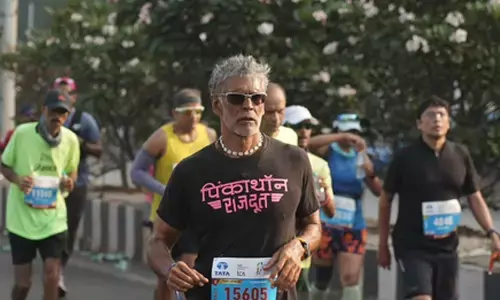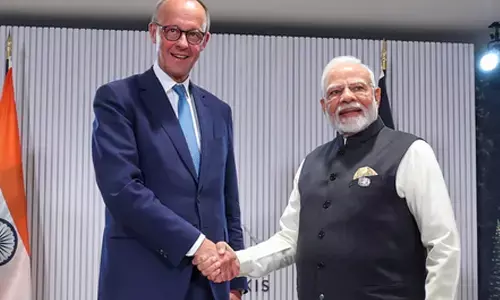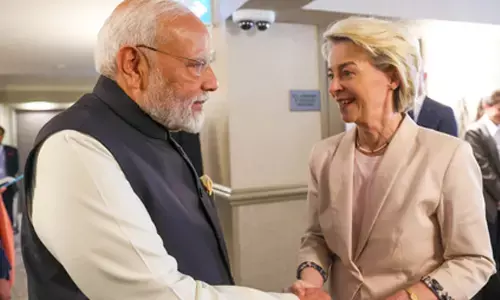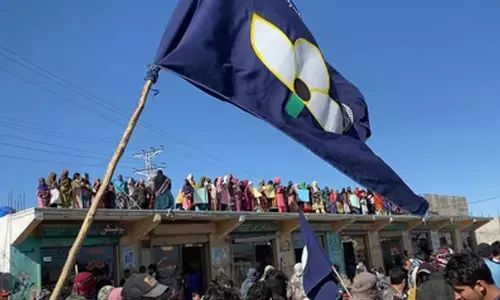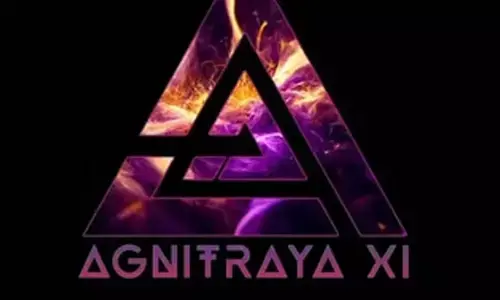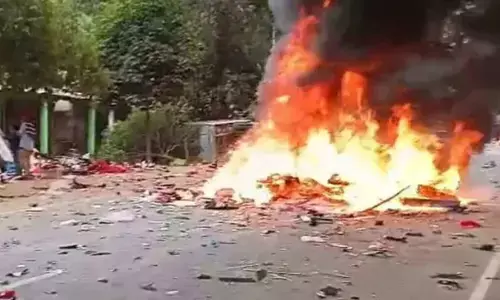Ghantasala ‘Music’ Story

Ghantasala ‘Music’ Story. There is only one God in the whole universe and he has a surname. He is Venkateswara Rao and his surname is Ghantasala - comments a fan.
His life story is more interesting than any work of fiction. He was born in 1922 to Soorayya, a popular local singer and Rattamma in Chowtapalli village near Gudivada of Krishna District. During his childhood he used to sing along as his father sang Tarangam. His exposure to music at such an early age moulded his love and genius in music during his later life. Unfortunately his father died when he was still a young kid and he was brought up by his maternal uncle. When he was 11, he ran off from home to join Maharaja Government College of Music and Dance in Vizianagaram. He had no money; so he had to resort to begging to survive, but his passion to learn music continued. This stage of his life was one of hardship and struggle almost on a daily basis. Finally, he managed to meet Dwaram Venkataswamy Naidu (Principal) and joined the music college. He went on to become a Sangeetha Vidhwan with impeccable training in Carnatic music.
As a youngster Ghantasala also took part in the freedom struggle and had joined the Quit India movement. As a result he was arrested and had to spend 18 months in jail. On his release he had the good fortune of meeting the famous lyricist Samudrala Raghavacharya who recognised his talent, the beauty and melody in his voice and was instrumental in introducing him to the film industry. The rest is history.
For 30 years, Ghantasala ruled the Telugu film music industry like a colossus and brought many innovations and improvements to it. He, however, did not limit himself to only Telugu songs. He also sang in Tamil, Kannada, Malayalam, Tulu, and Hindi. He recorded more than 13000 songs and this number excludes his numerous private recordings and his flawless and magnificent rendition of padyalu. He held concerts abroad in countries like USA, UK, Germany and Middle East etc. All his programmes were always sellouts. He was showered with gifts which he immediately donated. He also sang at the UN where he was decorated with the Peace Medal. Apart from innumerable awards, he was also conferred with the Padma Shree by the Government of India. He was the “Asthana Vidhwan” of Tirumala Tirupathi Devasthanam.
limit himself to only Telugu songs. He also sang in Tamil, Kannada, Malayalam, Tulu, and Hindi. He recorded more than 13000 songs and this number excludes his numerous private recordings and his flawless and magnificent rendition of padyalu. He held concerts abroad in countries like USA, UK, Germany and Middle East etc. All his programmes were always sellouts. He was showered with gifts which he immediately donated. He also sang at the UN where he was decorated with the Peace Medal. Apart from innumerable awards, he was also conferred with the Padma Shree by the Government of India. He was the “Asthana Vidhwan” of Tirumala Tirupathi Devasthanam.
 limit himself to only Telugu songs. He also sang in Tamil, Kannada, Malayalam, Tulu, and Hindi. He recorded more than 13000 songs and this number excludes his numerous private recordings and his flawless and magnificent rendition of padyalu. He held concerts abroad in countries like USA, UK, Germany and Middle East etc. All his programmes were always sellouts. He was showered with gifts which he immediately donated. He also sang at the UN where he was decorated with the Peace Medal. Apart from innumerable awards, he was also conferred with the Padma Shree by the Government of India. He was the “Asthana Vidhwan” of Tirumala Tirupathi Devasthanam.
limit himself to only Telugu songs. He also sang in Tamil, Kannada, Malayalam, Tulu, and Hindi. He recorded more than 13000 songs and this number excludes his numerous private recordings and his flawless and magnificent rendition of padyalu. He held concerts abroad in countries like USA, UK, Germany and Middle East etc. All his programmes were always sellouts. He was showered with gifts which he immediately donated. He also sang at the UN where he was decorated with the Peace Medal. Apart from innumerable awards, he was also conferred with the Padma Shree by the Government of India. He was the “Asthana Vidhwan” of Tirumala Tirupathi Devasthanam.His mellifluous and melodious voice, pitch variations, the expressions that he infused in his singing had won him plaudits and admiration from his contemporaries including Mohammed Rafi and Lata Mangeshkar who openly acknowledged his superior playback singing skills. He was a pioneer in modulating his voice and diction to suit the hero on the screen. His rendering of the Bhagavad Gita and The Ashtapadis are works of pure genius and to this day grace many a religious occasions. He also produced three movies. Some of the most memorable songs that he had sung for films are “Vaatapi Ganapatim Baje” from ‘Vinayaka Chaviti’, “Siva Sankari” from ‘Jagadekaveeruni Katha’, “Rajasekhara” with P Leela from the film ‘Anarkali’, “Hayi Haayiga Aamanisaage” from ‘Suvarna Sundari’, “Dinakara Subhakara” from ‘Vinayaka Chaviti’, amongst scores of others. The majesty and sheer magnetism of his voice earned him the affectionate title of ‘Gana Gandharva’ from his friends, admirers and colleagues. And he was Mastergaru to all.
When the meters of the music and the beauty within the lyrics were reaching their crescendo (from the 1940s well into the early 70s), Ghantasala moved alongside, lending his voice to the most memorable tunes and tones that Telugu film industry ever had the fortune of witnessing. His voice became so intertwined with the familiar faces on the screen that it sounded absurd and incongruous watching the familiar face mime to a different playback. No matter what the character that was portrayed on the screen was, be it mythological, social, romantic, devotional, comedy or tragedy, Ghantasala had to sing for him; "Vaalmiki" was Ghantasala, "RaamuDu" was Ghantasala, "LakshmanuDu" was Ghantasala, and so was "Chaakali vaaDu" who had to be Ghantasala.
He was a philanthropist who believed in helping his fellow men. He never let down anyone who came to him for help. His kind deeds made him into a demi-god, so much so that when he passed away hundreds of thousands of people came to pay their last respects. He also lived as an exemplary when it comes to dealing with his contemporaries. According to his daughter Dr Syamala who published his biography recently, Ghantasala was very magnanimous when singers like Mohammed Rafee were invited to sing in his place. During the time of making of ‘Bhale Thammudu’, producers wanted to engage Rafee to sing for NTR.
Rafee who was a great friend and admirer met him on his arrival at Chennai and begged for apology for venturing to sing in language unknown to him. Moved by the act, Ghantasala encouraged Rafee to make use of the opportunity, “I whole heartedly welcome you into Telugu singers’ fraternity," he had said. Lata Mangeshkar who had come to sing along with Rafee for the Hindi version of “Suvarnasundari” asked him to join her for at least few lines in Hindi (for the song ‘Kuhu Kuhu Bole Koyaliya’) as she liked his excellent rendition of Hindustani ragas in Telugu version (Hayi Haayiga Aamani Saage). But Ghantasala politely refused saying it is not proper for him to do so when his great friend had come to render the same song. After recording, Rafee himself admitted that he could not match up to Ghantasala’s Telugu version. It was Lata's Bhagavad Gita which prompted Ghantasala to record his version of the epic and render the meaning in simple Telugu language so as to reach common people. While Ghantasala gave life-long honour and respect to his family members, his songs provide livelihood to many singers who gain fame and name singing ‘Mastergaru’s’ songs in live concerts even today.
It was G Anand, a noted singer of the 70s who had started organising stage concerts of Ghantasala songs even before his death, in 1971. His organisation ‘Swaramadhuri’ organised 7,000 concerts in India and abroad. And there are many cultural organisations which are regularly conducting musical nites and Ghantasalaaradhanostavams on the lines of Saint Thyagaraja and Syamasastry. After Annammayya it was Ghantasala who was allowed to sing before the statue of Lord Venkateswara inside the sanctum sanctorum at Tirumala. And with due respects to Annamayya, it is Ghantasala songs on Venkateswara Swamy like “Namo Venkatesa” “Yedukondalaswamy” and songs in ‘Srinivasa Kalyanam’ that were popularised in Andhra Pradesh and there was a time when movie theatres would play these songs before the show begins. In sixties his rendition of Annamayya keerthana “Brahmakadigina padamu” was a regular song to be played during ‘Bhakthi Ranjani’ program on ‘All India Radio’.
Ghantasala’s daughter-in-law Parvathi, Bharatanatyam dancer, wife to his second son Ravi Kumar is continuing his tradition, but in a different sphere of art. She has always been captivated by the lilting and soulful songs of her legendary father-in-law. Listening to his magical and beautiful voice would transmit her into a higher plane of consciousness, where she would visualize in her mind the translation of his music into movement. She chose some of his songs, which were her favourites and choreographed them into a ballet “Gaana Gandharva”. It is her tribute to her legendary father-in-law, which she performs every year. And every time she performs the ballet and wherever she performs, it turns out to be a huge success.
Taking cue from SP Balasubramanyam who first initiated the installation of his statue at Public gardens, Hyderabad, several organisations across Andhra Pradesh installed his statues as a mark of respect to the legend. Every Telugu Cultural Association, not just in India but also abroad, made it a point to celebrate his birth and death anniversaries religiously every year. "I consider myself fortunate to be his son. I go speechless when I witness the love and affection showered on my father by his fans and admirers and the extent they go to keep his memory alive is heartening,” shares Ratnakumar, Ghantasala’s son and noted dubbing artist who gave voice to many heroes for more than 1000 films.
He is also a good writer and his daughter Veena has made her debut as a singer in the film, ‘Andala Rakshasi’ marking the entry of the third generation of Ghantasala family into Telugu films. Ratnakumar is currently pursuing with the government to set up a museum for the legendary singer where his records, pictures and other belongings can be kept. If government takes up this noble cause, this museum would definitely become a highly revered abode of music for the entire South India.
Next Story








